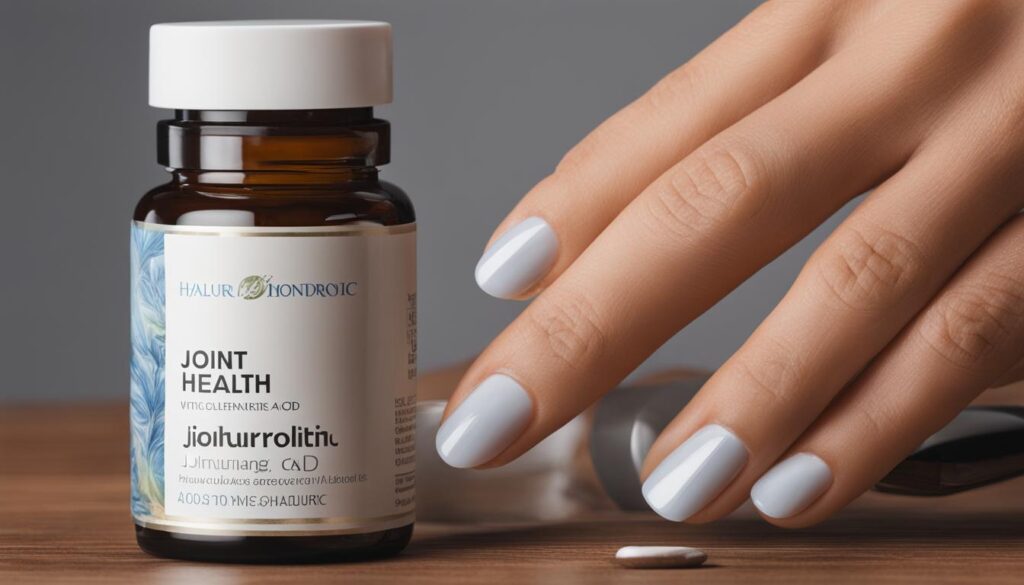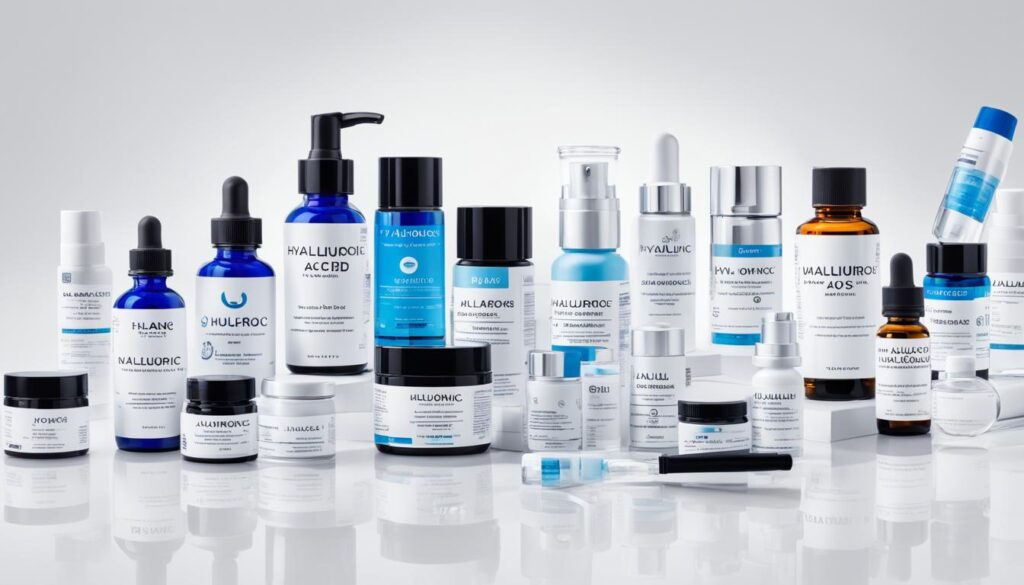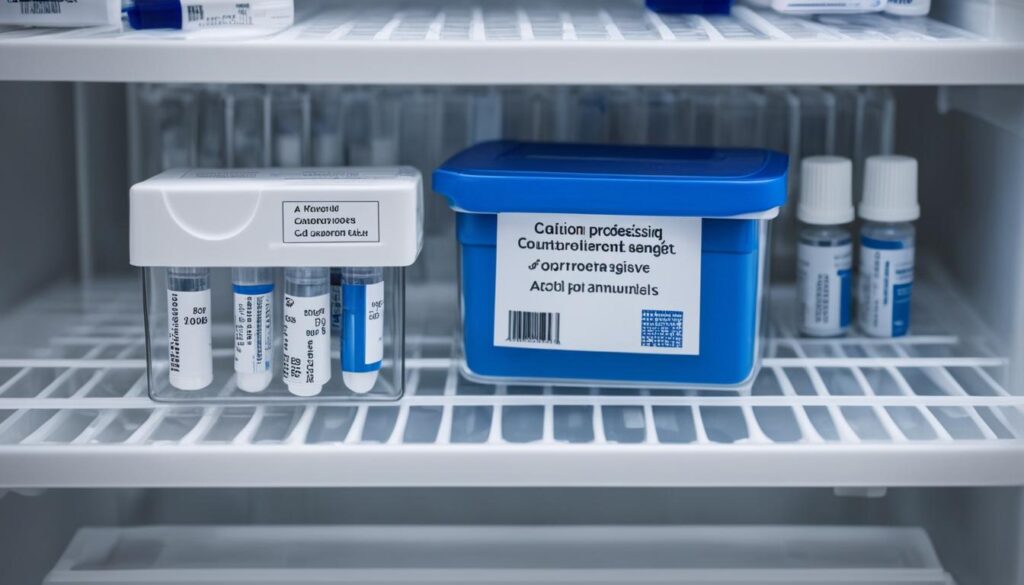Hyaluronic acid is a versatile substance with a range of uses and benefits. It occurs naturally in the body and plays a vital role in trapping water inside tissue cells. This property makes it valuable for various medical and commercial applications.
One of the primary uses of hyaluronic acid is in skincare. It is a popular ingredient in moisturizers, serums, and creams due to its ability to improve skin hydration, elasticity, and overall health. Hyaluronic acid helps retain water in the skin, making it appear plump and reducing the appearance of fine lines and wrinkles.
Furthermore, hyaluronic acid plays a crucial role in joint health. It is naturally found in the synovial fluid, which lubricates and cushions the joints. With age, the levels of hyaluronic acid decrease, leading to joint pain and stiffness. Hyaluronic acid supplements and injections can help replenish the levels of hyaluronic acid in the joints, reducing pain and improving mobility.
Hyaluronic acid also contributes to wound healing. It promotes skin hydration, controls inflammation, and accelerates the healing process. As a result, it is commonly used in topical products for wound care, showing promising results in treating wounds like diabetic foot ulcers.
Overall, the myriad benefits of hyaluronic acid make it a sought-after ingredient in skincare, joint health treatments, and wound healing products. Its versatility and natural occurrence in the body make it an appealing option for various applications.
Key Takeaways:
- Hyaluronic acid is a versatile substance with numerous medical and commercial uses.
- It is commonly used in skincare products to improve hydration, elasticity, and reduce signs of aging.
- Hyaluronic acid supplements and injections can relieve joint pain and improve mobility.
- It plays a significant role in wound healing by promoting hydration and controlling inflammation.
- Selecting high-quality products and consulting a healthcare professional is important when using hyaluronic acid.
How Does Hyaluronic Acid Work?

Hyaluronic acid, with its unique chain-like structure, has remarkable abilities to retain and hold large amounts of water. This property makes it an ideal molecule for moisturizing the skin by absorbing and locking in moisture. Its water-holding capacity also enables hyaluronic acid to be used for targeted drug delivery and transportation of other molecules throughout the body.
Moreover, hyaluronic acid acts as a scaffold structure, providing support and promoting tissue growth. This is particularly beneficial in wound healing, where hyaluronic acid aids in the regeneration of damaged tissues. By promoting hydration and controlling inflammation, hyaluronic acid plays a vital role in accelerating the healing process.
Targeted Drug Delivery
In addition to its moisturizing and tissue-growing functions, hyaluronic acid has the ability to attach itself to cells, making it an effective tool for targeted drug delivery. The chain-like structure of hyaluronic acid allows it to bind to specific receptors on target cells, ensuring that therapeutic agents reach their intended destinations.
Hyaluronic acid’s versatile nature and unique properties make it an intriguing subject of ongoing scientific research. Scientists continuously explore its potential applications in various fields, further advancing our understanding of how this remarkable substance works.
To summarize, the multi-faceted hyaluronic acid molecule can absorb water, moisturize the skin, transport molecules throughout the body, promote tissue growth, and aid in wound healing. Its versatility and promising potential continue to intrigue scientists and researchers.
Hyaluronic Acid for Skin Health

Hyaluronic acid is a powerful ingredient with multiple benefits for skin health. Its ability to retain water makes it an ideal moisturizing agent, ensuring optimal skin hydration. By keeping the skin hydrated, hyaluronic acid helps in maintaining a plump and youthful appearance while reducing the appearance of fine lines and wrinkles.
In addition to its hydrating properties, hyaluronic acid also improves skin elasticity, making it more supple and flexible. This contributes to a smoother, firmer complexion, enhancing the overall texture and quality of the skin.
When it comes to skincare, hyaluronic acid can be found in a variety of products, including moisturizers, serums, and creams, specifically formulated to provide its numerous benefits. These products work by delivering hyaluronic acid directly to the skin, ensuring maximum absorption and efficacy.
With its exceptional moisturizing and anti-aging properties, hyaluronic acid has become a staple ingredient in the skincare industry. Its popularity stems from its ability to improve skin hydration, reduce the signs of aging, and promote a more radiant and youthful complexion.
Hyaluronic Acid for Joint Health

Hyaluronic acid plays a crucial role in maintaining joint health. It is naturally present in the synovial fluid, which lubricates and cushions the joints, allowing for smooth movement and flexibility. However, as we age, the levels of hyaluronic acid in the synovial fluid decrease, leading to joint pain and stiffness.
To alleviate these symptoms and improve joint health, hyaluronic acid supplements and injections can be beneficial. These treatments help replenish the levels of hyaluronic acid in the joints, reducing pain and improving mobility. They are commonly used for conditions such as osteoarthritis and other joint-related issues.
By restoring the natural levels of hyaluronic acid, these treatments provide lubrication and cushioning to the joints, promoting better joint function and reducing discomfort. They can help individuals regain their mobility and engage in activities they enjoy without the limitations caused by joint pain.
Benefits of Hyaluronic Acid for Joint Health
Hyaluronic acid supplements and injections offer several benefits for joint health:
- Reduces joint pain and stiffness
- Improves joint mobility and flexibility
- Enhances the lubrication and cushioning of the joints
- Promotes overall joint health and function
These treatments provide targeted relief to the affected joints, helping individuals manage their symptoms and improve their quality of life.
How to Use Hyaluronic Acid for Joint Health
Hyaluronic acid supplements are commonly available in oral capsule or tablet form. The recommended dosage may vary depending on the specific product, so it is important to follow the instructions provided by the manufacturer or consult a healthcare professional for personalized guidance.
For individuals with more severe joint pain or those who have not experienced sufficient relief from oral supplements, hyaluronic acid injections may be recommended. These injections are typically administered directly into the affected joint by a healthcare professional.
It is important to note that hyaluronic acid treatments may not be suitable for everyone. It is recommended to consult a healthcare provider before starting any new supplement or treatment, especially if you have any pre-existing medical conditions or are taking other medications.
Hyaluronic Acid Supplements and Injections for Joint Health
| Treatment Option | Method of Administration | Benefits | Potential Side Effects |
|---|---|---|---|
| Hyaluronic Acid Supplements | Oral capsules or tablets | Reduces joint pain and stiffness Improves joint mobility | May cause gastrointestinal discomfort Allergic reactions in some individuals |
| Hyaluronic Acid Injections | Directly into the affected joint | Localized relief from joint pain and inflammation Improves joint function | Potential risk of infection or bleeding at the injection site Allergic reactions in some individuals |
It is advisable to discuss the potential benefits and risks of hyaluronic acid treatments with a healthcare professional to determine the most suitable option for your specific needs and condition.
Hyaluronic Acid for Wound Healing

Hyaluronic acid plays a crucial role in wound healing. Its ability to promote hydration in the wound is essential for the healing process. By controlling inflammation and redirecting blood flow to the damaged tissue, hyaluronic acid accelerates the healing process.
This versatile substance has shown promising results in speeding up the healing of various types of wounds, including diabetic foot ulcers. It is commonly used in topical products specifically designed for wound care.
With its hydrating properties and ability to aid in controlling inflammation, hyaluronic acid is an effective ingredient for facilitating the healing of wounds.
To visually represent wound healing, consider adding an image that showcases the process of tissue regeneration or the application of a wound care product. For example:
Safety and Usage Tips
When it comes to using hyaluronic acid, following proper safety guidelines and usage tips is crucial for achieving the desired results and avoiding any potential adverse effects. Here are some essential considerations:
- Over-the-counter Skincare Products: Hyaluronic acid is commonly found in skincare products due to its hydrating properties. Over-the-counter products containing hyaluronic acid are generally safe to use for skin hydration and rejuvenation purposes.
- Hyaluronic Acid Supplements: Similar to skincare products, oral hyaluronic acid supplements are considered safe for most individuals. These supplements are often taken to support joint health and overall well-being.
- Prescription Hyaluronic Acid Products: Prior to using prescription hyaluronic acid products or seeking hyaluronic acid injections, it is crucial to consult with a healthcare provider. They can evaluate your specific needs, provide personalized guidance, and ensure proper administration.
- Perform Patch Test: Whether using new skincare products or prescription hyaluronic acid treatments, performing a patch test is recommended. Apply a small amount of the product on a small area of your skin and observe for any possible allergic reactions before applying it to your entire face or body.
- Consult a Healthcare Provider: Before incorporating any new supplement or medication, including hyaluronic acid, into your healthcare regimen, it is essential to consult a healthcare provider. They can assess your medical history, determine potential interactions or contraindications, and provide personalized advice.
Following these safety and usage tips ensures that you maximize the benefits of hyaluronic acid while minimizing any potential risks or side effects.
Selecting High-Quality Hyaluronic Acid Products

When it comes to hyaluronic acid products, choosing the best quality options is essential for optimal results. To ensure that you invest in products that meet industry standards and provide the desired benefits, consider the following tips:
1. Look for Reputable Brands
Start by choosing hyaluronic acid products from well-established and reputable brands. These brands have a track record of delivering high-quality products that have been thoroughly tested and proven effective. Look for brands that specialize in skincare or joint health and have a positive reputation among consumers and professionals.
2. Read Reviews
Reading customer reviews can offer valuable insights into the quality and effectiveness of hyaluronic acid products. Look for feedback from individuals who have used the product and pay attention to their experiences and results. Positive reviews from satisfied customers can indicate that the product meets expectations, while negative reviews may raise concerns about quality.
3. Check for Certifications
Ensure that the hyaluronic acid products you consider have the necessary certifications and approvals. Look for certifications from regulatory bodies or third-party organizations that validate the product’s quality, safety, and compliance with industry standards. Certifications provide an added level of assurance that the product is reliable and trustworthy.
4. Seek Professional Guidance
Consulting a healthcare professional or dermatologist can help you navigate the wide range of hyaluronic acid products available and select the most suitable one for your specific needs. These professionals have expertise in skin health, joint health, or wound healing and can provide personalized recommendations based on your individual circumstances and requirements.
By following these guidelines, you can make an informed decision and select high-quality hyaluronic acid products that deliver the best results for your skin, joints, or wound healing needs.
Storage and Cautions

To maintain the quality of hyaluronic acid products, it is important to store them properly. Follow these storage tips and cautions:
- Store in a cool, dry place: Most hyaluronic acid products should be stored in a cool, dry place to prevent degradation and maintain their efficacy. Avoid storing them in areas with high humidity or fluctuating temperatures.
- Away from direct sunlight: Exposure to direct sunlight can accelerate the degradation of hyaluronic acid. Store the products in a place where they are shielded from sunlight, such as a cool drawer or cabinet.
- Check the expiration date: Before using hyaluronic acid products, always check the expiration date. Expired products may not provide the desired benefits and could potentially cause adverse reactions.
- Discard expired products: If you come across any hyaluronic acid products that have expired, it is important to discard them. Using expired products can be ineffective and may lead to skin irritation or other complications.
- Follow usage instructions: Whether it’s skincare or supplement products, always follow the specific usage instructions provided by the manufacturer. Each product may have different application methods and recommended frequencies, so it’s crucial to adhere to these guidelines.
- Observe cautions: Pay attention to any cautionary statements or warnings provided by the manufacturer. These may include information about potential allergies, specific skin types, or other factors to consider before using the product.
- Discontinue use if adverse reactions occur: If you experience any adverse reactions, such as severe redness, itching, or swelling, discontinue the use of the product immediately. It is recommended to consult a healthcare professional or dermatologist for further guidance.
Proper storage and adherence to usage tips and cautions play a crucial role in maximizing the benefits of hyaluronic acid products while ensuring safety and efficacy.
Culinary and Other Topical Uses of Hyaluronic Acid

Aside from skincare and joint health, hyaluronic acid also finds use in various other applications. Its water-holding capacity makes it a common ingredient in culinary creations like edible films and coatings, giving them a unique texture and moisture retention. In the personal care industry, hyaluronic acid is utilized in toothpaste and mouthwash for its moisturizing properties, promoting oral health. Its ability to attract and retain water also makes it an excellent ingredient in household items such as laundry detergents and air fresheners, providing enhanced freshness and softness.
The versatility of hyaluronic acid extends beyond the realms of skincare and joint health, finding a place in diverse areas of everyday life. Its unique properties and applications continue to be explored, unveiling even more possibilities for this remarkable substance.
Culinary and Topical Uses of Hyaluronic Acid
| Application | Examples |
|---|---|
| Culinary | Edible films and coatings |
| Personal Care | Toothpaste, mouthwash |
| Household | Laundry detergents, air fresheners |
When to Consult a Healthcare Provider
If you are considering incorporating hyaluronic acid into your healthcare routine, it is important to consult a healthcare provider. This is especially crucial if you are interested in using hyaluronic acid as a supplement or exploring treatment options that involve hyaluronic acid.
By speaking with a healthcare provider, you can receive personalized guidance tailored to your specific needs and conditions. They can provide valuable insights into how hyaluronic acid may benefit you and address any concerns or questions you may have regarding its usage.
If you have specific medical conditions related to skin health, joint health, or wound healing, it is essential to consult a healthcare provider. They can help assess the suitability of hyaluronic acid for your situation and advise on the best course of action.
Remember, healthcare providers are equipped with the knowledge and expertise to ensure your safety and well-being. Seeking their advice before incorporating hyaluronic acid into your healthcare regimen can help you make informed decisions and achieve optimal results.
Conclusion
Hyaluronic acid is a versatile substance that offers a wide range of benefits and uses. It has gained popularity in skincare and joint health treatments due to its ability to improve skin hydration, reduce signs of aging, relieve joint pain, and promote wound healing. However, it is important to follow instructions and consult a healthcare provider before using prescription products or receiving injections.
Choosing high-quality hyaluronic acid products and storing them properly is crucial to ensure their effectiveness. With its numerous benefits and ongoing research, hyaluronic acid continues to hold promise for its potential applications in various fields.
References
As I compiled information for this article, I referenced several reliable sources to ensure accurate and up-to-date information regarding the uses and benefits of hyaluronic acid.
The first source I utilized is an article from Medical News Today, a trusted platform for medical and health-related news. This article provides a comprehensive overview of the uses and benefits of hyaluronic acid, covering its applications in skincare, joint health, and wound healing.
In addition to Medical News Today, I also consulted review articles, clinical trials, and scientific studies that delve into the various uses and benefits of hyaluronic acid. These sources provide valuable insights into the versatility and efficacy of hyaluronic acid in different fields.
Moreover, multiple studies and reviews focusing specifically on hyaluronic acid in skincare, wound healing, and joint health applications were essential references for this article. These studies contribute to the growing body of research surrounding the potential therapeutic uses of hyaluronic acid.
References
What are the benefits of hyaluronic acid?
Hyaluronic acid has various benefits, including improving skin hydration, reducing wrinkles, relieving joint pain, and promoting wound healing.
How does hyaluronic acid work?
Hyaluronic acid works by trapping water inside tissue cells, promoting hydration and elasticity. It can also transport other molecules throughout the body and act as a scaffold for tissue growth.
How can hyaluronic acid benefit skin health?
Hyaluronic acid improves skin hydration, reduces the appearance of wrinkles, and enhances elasticity, making the skin look plump and youthful.
Can hyaluronic acid help with joint health?
Yes, hyaluronic acid supplements and injections can replenish the levels of hyaluronic acid in the joints, reducing pain and improving mobility, especially in conditions like osteoarthritis.
Is hyaluronic acid beneficial for wound healing?
Yes, hyaluronic acid promotes wound hydration, controls inflammation, and accelerates the healing process, making it beneficial for wound healing, including diabetic foot ulcers.
Are hyaluronic acid products safe to use?
When used as directed, hyaluronic acid products are generally safe. However, it is important to follow instructions and consult a healthcare provider before using prescription products or receiving injections.
How can I select high-quality hyaluronic acid products?
To select high-quality hyaluronic acid products, look for reputable brands, read reviews, and check for certifications. Consulting a healthcare professional or dermatologist can also provide guidance.
How should I store hyaluronic acid products?
Most hyaluronic acid products should be stored in a cool, dry place, away from direct sunlight. It is also important to check the expiration date and discard expired products.
What are the other uses of hyaluronic acid?
In addition to skincare and joint health, hyaluronic acid is used in culinary creations, personal care products, and household items due to its water-holding and moisturizing properties.
When should I consult a healthcare provider about hyaluronic acid?
It is advisable to consult a healthcare provider before incorporating hyaluronic acid into your healthcare regimen, especially if you are using it as a supplement or seeking treatment options involving hyaluronic acid.






